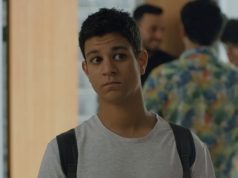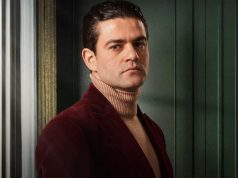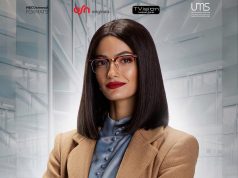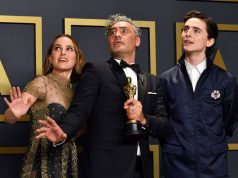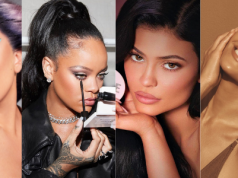 From Playing a Psychiatrist to Writing his Own Scripts
From Playing a Psychiatrist to Writing his Own Scripts
By Francesca Sullivan
Viewers of the highly original and shocking psychological drama Thirty Days that gripped TV audiences this Ramadan are probably still reeling from the experience. Written by first-time script-writer Mustafa Gamal Hashim, the series featured Asser Yassin as a psychiatrist who finds himself drawn into a living nightmare.
Cairo West Magazine caught up with him on the set during the final days of shooting, to talk acting, writing and other creative pursuits…
CWM: Asser, How did the role of the Tarek the psychiatrist come to you, and what attracted you to it?
AY: I actually read for both roles, Tarek and Toufik (played by Basel Khayat), but Tarek was my preferred choice because of the challenges it presented. As the series goes on and he is under increasing stress, his reactions develop and change. Each incident has a different impact and discloses something new about him to the audience. It’s as if he’s in a dark room and there are punches coming at him from all sides but he can’t see what’s next. So it’s about portraying someone on the brink – this was appealing to me.
There’s a kind of philosophical question that we ask in the series. Every human being has a breaking point. If you put them under enough stress, no matter how saintly a person is there will be something about their responses you’re going to dislike, and you will ask yourself, how would I behave under these circumstances?
How did you deal with the intensity of such a role when you were off the set?
Happily we shot it all in one go. Having three or four days away from it was disastrous for me, because it was hard to snap in and out of it; subconsciously the character was still with me and I’d be exhausted. A bit like working out intensively at the gym for a long period; when you stop you hardly have the energy to do anything else.
Did you do any special preparation for the role?
I nominated a psychiatrist friend of mine, Dr. Georgette Savvides, to be our consultant for the whole series. I had sessions with her to discuss, for example, how I should behave and think as a psychiatrist, and what happens to someone under that amount of stress. In the script, Tarek is always reaching for another cigarette, but I didn’t want to smoke – even though that would actually have been easier. Firstly, I see that as a bad influence on such a large audience, and secondly it was more interesting to look at other ways of showing his emotional state. So we concentrated on his mood changes, increasingly aggressive behavior, he even develops a tic.
 What are the challenges for an actor when shooting a thirty-episode Ramadan series, compared to shooting a movie?
What are the challenges for an actor when shooting a thirty-episode Ramadan series, compared to shooting a movie?
It’s definitely harder since there’s so much more footage to cover – around eighty-four days of shooting, compared to four to six weeks for a film. It’s an actor’s workout, testing your stamina, knowing your lines, sometimes we shot up to twenty-two scenes in one day! When shooting film, you have the luxury of doing one scene over two or three days. In terms of character development the approach is the same, but the assistant director might help by not scheduling too many intense emotional scenes close together, allowing the actor some mellower scenes in between.
For the make-up department it was quite challenging because my character changes physically over the series, becoming more and more sleep deprived and zombie-like.
Speaking of a workout, how do you keep fit?
Well, I would like to go to the gym but in reality I don’t have time!
What kinds of roles are you most drawn to?
I started in drama and action, and I’ve successfully tried comedy also. Before the revolution, my plan was to do as many alternating film genres as possible, but since then the whole map has been reshuffled, even the star system. Television is increasingly the go-to place for actors, with production values much higher, on-demand viewing and more roles.
 Do you think this has had an effect on the film industry itself?
Do you think this has had an effect on the film industry itself?
Globally yes. Now that you can stream movies on your tablet, why go to a cinema to watch them? Of course actually being there is a different kind of experience, and the industry is doing its best to attract audiences with 3D and 4D effects. I believe cinema will stay, but definitely TV has taken a huge leap, particularly given the current economic and time constraints in many peoples’ lives.
How do you see the current state of the movie industry in Egypt?
Cinema has its own cycle that seems to run at around ten to fifteen years, with regards not only to actors’ careers but also directors and script-writers. So whoever was at the top fifteen years ago will be replaced with new blood, new mentalities and ideas. The system itself is changing, when I started as an actor the only way to get into the industry was through small, independent film or theatre productions in the hopes that a director would notice you, and those were scarce. Now with increased social media opportunities it’s easier – you can get noticed on YouTube and even have your own followers. And though that doesn’t necessarily translate to getting acting work, there are also more casting agencies and a higher demand. In the last couple of years completely unknown actors like Amina Khalil, Ahmed Magdy and Jamila AbouOwed have emerged onto the scene on their own merit.
Have you any projects in the pipeline? International film offers?
I have been given a few scripts but they usually involve clichéd stereotypes of Arabs, blowing people up or being involved in illegal organ trade! So I’ll just keeping digging until something more interesting comes up. My best option is to jump to international cinema from an Egyptian production that gets seen at film festivals. Egypt can produce great movies, and I don’t see why a film has to be political or dealing with a taboo subject to get shortlisted at a festival – it could simply be a really good romantic comedy. Since good scripts are hard to come by, I’ve actually been working on writing my own; I’m working on two right now.
Do you have a dream role, or a particular person you would like to portray?
Yes: Magdy Yacoub. For me he commands the utmost respect in terms of his total competence, lifetime achievement and legacy. What he will be passing on is something extraordinary.
How do you see your love of painting in relation to your life as an actor?
It’s interesting because these things are related. With acting you learn the craft and the techniques, and then you add feeling to them. Painting is a similar process; you learn about the canvas and the brush-work and the layering, and then you use these with emotion. So they are very relevant to each other.
QUICKFIRE QUESTIONS
Your favorite getaway spot in the summer?
Sahel.
The most worn item of clothing in your wardrobe?
Jeans.
The thing you feel most passionately about?
Being creative.
Your most treasured memory?
Too many to name!
Favorite aroma?
Lavender.
Guilty pleasure?
Smoking.



